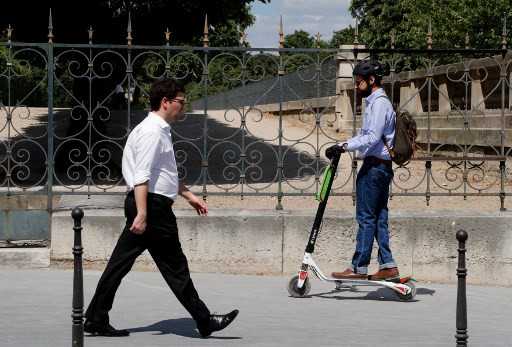Scooters, e-bikes gain traction while virus lockdowns ease
17 June, 2020

Electric bikes and scooters, dismissed prior to the pandemic as a curiosity or nuisance, are receiving fresh traction on cities seeking new transportation options because they emerge from lockdowns.
Some "micromobility" operators which cut back or shut straight down during the coronavirus lockdowns are actually expanding to meet up growing demands.
Shared mobility operators Lime, Bird and Ford-owned Spin report robust growth in cities global, despite a near-shutdown of tourism, as persons transform to scooters and e-bikes for commuting or errands.
"People are in need of open air transportation where they are able to maintain social distancing," said David Spielfogel, chief policy officer at Lime, which includes relaunched in almost all of its 100-as well as cities.
Spielfogel said city officials have warmed to the idea of micromobility despite a nice attitude just months earlier.
"There's been a sea switch in the frame of mind of cities from finding micromobility as novelty mostly utilized by tourists to looking at bikes and scooters as a good core little bit of the transportation program that may thrive found in the post-pandemic period," he said.
"Cities are afraid that people will return to cars, as a result they see this as an excellent option."
Lime, which has decided to take over the Uber Leap scooters and bikes, stated it possesses seen "exponential" growth found in cities such as Paris, Washington, Tel Aviv, Oklahoma Metropolis and Zurich, amongst others,
Spin recently unveiled plans to start its shared e-scooters in Cologne and other German cities, and will expand in US cities including Atlanta.
Spin said it had seen weekly consumption increases of some 30 percent since April with persons using scooters for longer periods.
The scooters "are staying used now as part of your as a utility rather than for leisurely activities," said Euwyn Poon, president and cofounder of Spin.
Global scooter operator Bird also stated business is finding out about, with North American ridership a lot more than double pre-pandemic levels.
"Around the world, a growing number of people are trying micromobility for the very first time," Bird said in a blog page post.
Shifting gears
In the months prior to the pandemic, some local officials were decrying dockless bikes and scooters as nuisances creating sidewalk "clutter."
However the pandemic has changed the outlook, with fear of crowds cutting transit ridership by 70 to 90 percent.
"The pandemic possesses certainly changed just how communities view micromobility," said Susan Shaheen, co-director of the Transportation Sustainability Study Center at the University of California at Berkeley.
"Anecdotal evidence shows that a whole lot of communities are thinking about micromobility as a crucial technique to maintain social/physical distancing as being the economy reopens."
Traditional bicycling is also experiencing a revival in lots of cities, spurred by fresh protected lanes which might be used by the tiny electric vehicles as well.
The pandemic disruption "has generated fertile ground" for micromobility, said Annie Chang, head of new mobility for the engineering association SAE International and writer of a report on COVID's impact on transportation.
"I think persons have begun to see the value of tiny vehicles and that value increase as the technology improves."
Without new options, she noted, various cities could see a rise in auto traffic and congestion.
Finding an economical model
Harriet Tregoning, director of the Numo Alliance, a nonprofit group centered on urban mobility, said the financial model for shared micromobility companies remains murky.
Venture-funded firms which cater to tourists and college or university campuses may just marginally help with post-COVID transportation needs, she said.
These services have more value if integrated into transportation systems, Tregoning said.
This could be done in coordination with transit agencies to greatly help reach underserved areas, with the possibility of public or employer subsidies for "bundled" subscriptions.
Tregoning said micromobility may become a good more important factor if cities invest and coordinate with transportation agencies.
"Cities need to spend money on bikesharing and create a strategic relationship to transit," she said.
Technology analyst Richard Windsor said e-bikes "are a good alternative to public transportation since the motor assistance may make the commute easier for those that are actually less fit or usually do not like to arrive in the office drenched in sweat."
But Windsor writes on his Radio Free of charge Mobile blog page that the trend "tips towards a user desire towards ownership and from sharing."
Source: www.thejakartapost.com
